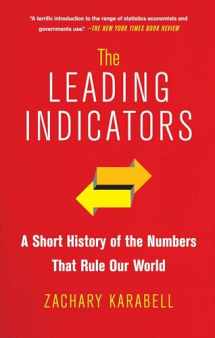
The Leading Indicators: A Short History of the Numbers That Rule Our World
ISBN-13:
9781451651225
ISBN-10:
1451651228
Edition:
Reprint
Author:
Zachary Karabell
Publication date:
2014
Publisher:
Simon & Schuster
Format:
Paperback
304 pages
FREE US shipping
on ALL non-marketplace orders
Marketplace
from $15.07
USD
Marketplace offers
Seller
Condition
Note
Seller
Condition
New
Brand New! Not overstocks! Brand New direct from the publisher! Ships in sturdy cardboard packaging.
Book details
ISBN-13:
9781451651225
ISBN-10:
1451651228
Edition:
Reprint
Author:
Zachary Karabell
Publication date:
2014
Publisher:
Simon & Schuster
Format:
Paperback
304 pages
Summary
The Leading Indicators: A Short History of the Numbers That Rule Our World (ISBN-13: 9781451651225 and ISBN-10: 1451651228), written by authors
Zachary Karabell, was published by Simon & Schuster in 2014.
With an overall rating of 3.5 stars, it's a notable title among other
Econometrics & Statistics
(Economics, Economic History, Statistics, Education & Reference, United States History) books. You can easily purchase or rent The Leading Indicators: A Short History of the Numbers That Rule Our World (Paperback) from BooksRun,
along with many other new and used
Econometrics & Statistics
books
and textbooks.
And, if you're looking to sell your copy, our current buyback offer is $0.53.
Description
The Leading Indicators was widely and well received as a much needed corrective to the outdated, outmoded economic figures we are accustomed. Every day, we are bombarded with numbers that tell us how we are doing, whether the economy is growing or shrinking, whether the future looks bright or dim. Gross national product, balance of trade, unemployment, inflation, and consumer confidence guide our actions, yet few of us know where they come from, what they mean, or why they rule our world.
Zachary Karabell tells the fascinating history of these indicators, which were invented in the mid-twentieth century to address the urgent challenges of the Great Depression, World War II, and the Cold War. They were rough measures—designed to give clarity in a data-parched world that was made up of centralized, industrial nations—yet we still rely on them today.
Today’s world is shaped by information technology and the borderless flow of capital and goods. If we follow a 1950s road map for a twenty-first-century world, we will get lost.
What is urgently needed is not to invent a new set of numbers but to tap into the data revolution that offers unparalleled access to the information we need. Companies should not base their business plans on GDP projections; individuals should not decide whether to buy a home or get a degree based on the national unemployment rate. If you want to buy a home, look for a job, start a company or run a business, you can readily find your own indicators. National housing figures don’t matter; local ones do. You can find those at the click of button. Personal, made-to-order indicators will meet our needs today, and the revolution is well underway. We need only to join it.
Zachary Karabell tells the fascinating history of these indicators, which were invented in the mid-twentieth century to address the urgent challenges of the Great Depression, World War II, and the Cold War. They were rough measures—designed to give clarity in a data-parched world that was made up of centralized, industrial nations—yet we still rely on them today.
Today’s world is shaped by information technology and the borderless flow of capital and goods. If we follow a 1950s road map for a twenty-first-century world, we will get lost.
What is urgently needed is not to invent a new set of numbers but to tap into the data revolution that offers unparalleled access to the information we need. Companies should not base their business plans on GDP projections; individuals should not decide whether to buy a home or get a degree based on the national unemployment rate. If you want to buy a home, look for a job, start a company or run a business, you can readily find your own indicators. National housing figures don’t matter; local ones do. You can find those at the click of button. Personal, made-to-order indicators will meet our needs today, and the revolution is well underway. We need only to join it.


We would LOVE it if you could help us and other readers by reviewing the book
Book review

Congratulations! We have received your book review.
{user}
{createdAt}
by {truncated_author}


